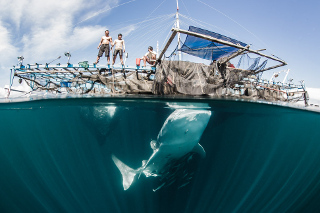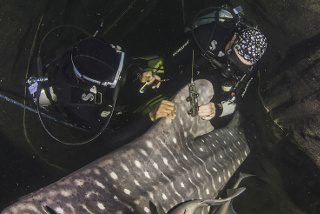 “The Galapagos of Indonesia’s reefs”, Indonesia’s Cenderawasih Bay earned its name due to the diversity of marine species that calls this incredible area ‘home’.
“The Galapagos of Indonesia’s reefs”, Indonesia’s Cenderawasih Bay earned its name due to the diversity of marine species that calls this incredible area ‘home’.
An innovative project by Conservation International has highlighted that many young male whale sharks, literally do consider this area to be ‘home’. Conservation International has been collaborating with Cenderawasih fishermen to tag the world’s largest fish. Previous attempts to collect data (location, diving depths and temperatures) have been unsuccessful due to the high rate of tags coming detached from these gentle giants. Up until now, fin-mount tags were not used as whale sharks are simply too big to ‘capture’ and bring along side a vessel and mount the tags.
Whale sharks are inadvertently captured in Cenderawasih fisherman’s silverside baitfish nets, a favourite food of whale sharks. Before the whale sharks are safely released, Conservation International researchers attach custom designed Wildlife Computers finmount SPLASH10-346A satellite tags (with a 2 year battery life) to the whale shark’s dorsal fin.
 To date, 16 individuals have been tagged; 5 of these have been tracked for more than a year. Each time the fish surfaces; data is transmitted providing scientists with a wealth of information about the enigmatic whale shark. Despite their size and potential for long distance migrations, the data has shown that the Cenderawasih whale sharks are largely ‘home-bodies’. You too can follow the whale sharks movements via Conservation International’s live-tracking site.
To date, 16 individuals have been tagged; 5 of these have been tracked for more than a year. Each time the fish surfaces; data is transmitted providing scientists with a wealth of information about the enigmatic whale shark. Despite their size and potential for long distance migrations, the data has shown that the Cenderawasih whale sharks are largely ‘home-bodies’. You too can follow the whale sharks movements via Conservation International’s live-tracking site.
If diving with whale sharks is on your must experience list, then this is a destination not to be missed. Seeing a whale shark here is literally a sure thing! Dive The World offers you a number of liveaboard diving cruises to Cenderawasih. Our friendly and efficient sales team are available to assist you with your Cenderawasih liveaboard diving holiday booking.